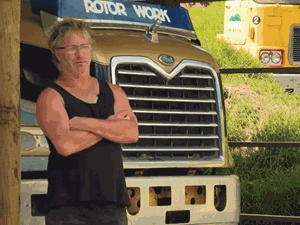Cover story: Outback Truckers Jo and Nick Atkins
A peek into the lives of Jo and Nick Atkins from the Outback Truckers television show
Kununurra, in northern Western Australia, is about as remote as you can get and that’s precisely why Nick and Jo Atkins love it. They operate their trucking business North Kimberley Transport (NKT) out of here and are known to tackle work and go places many others won’t.
We often see them on the Outback Truckers show, hauling up to three trailer loads over rutted, narrow red dirt roads with a new drama at each turn. That’s partly true, but the real story isn’t always that dramatic; it’s simply about a hardworking couple who provide reliable freight services to remote communities.
Life in the Kimberley
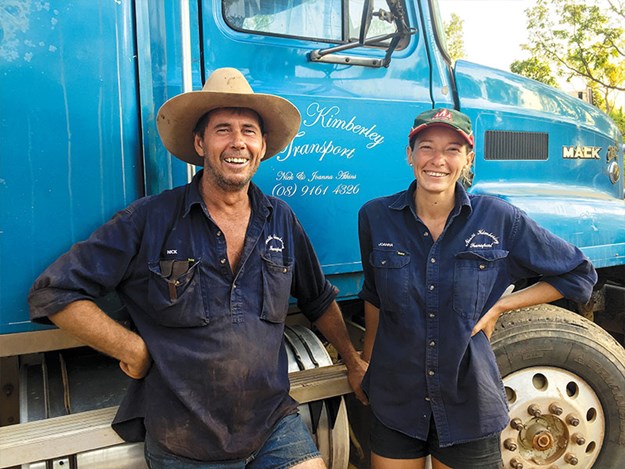 |
|
Loving the trucking lifestyle: Nick and Jo Atkins
|
Nick and Jo grew up in the Kimberley region. Jo grew up on Drysdale River Station, a million-acre cattle ranch—a standard-sized property for the Kimberleys, says Jo.
"My parents bought it in 1985. After going to boarding school in Darwin, I did some travelling and ended up back on the station working for the family business. That’s where I met Nick. He’d always worked on cattle stations as a jackaroo before getting into driving machines and trucks."
Nick grew up doing sheep, cattle, and droving work.
"All the kids and the parents worked as a team, same as me and my brothers and sister. So, I guess we both learned from our parents that you only have each other, and you have to get on with it."
Six years ago, Nick and Jo bought a 30-acre block in Batchelor, which is 100km south of Darwin. When not out on the road, they’ve been busy building their own house.
"We’re learning as we go, so it’s slow but lots of fun. It’s rewarding to finish each section; we seem to get one room done a year. Nick swears I can’t measure anything properly. I must have the most crooked eye!"
While that’s their home for most of the year, they work out of Kununurra for the dry season.
"Our off-season is when the rains start—October to March—and then we work from March to September, which is dry."
This year has been quiet for trucking because of COVID-19, says Jo.
"Kalumburu, where we take a lot of our freight, shut the door and said, ‘We don’t want anyone to come here for next two years.’ Fortunately, because we’ve got a grader, loader, and bulldozer, we’ve been doing other work. Nick and I are owner-operators; it’s just us, so it’s not too bad."
With their grading or trucking work, whoever rings up first, gets done first.
"We’ve been working for the Department of Parks and Wildlife, grading roads and firebreaks in their national parks. We go out for a month or two and take a mobile roadworks camp that we tow on the back of the trailer. We take all our food and go and camp out in the national park for a month or two. It’s very special; we get to go out to all these cool places where the public often aren’t allowed to go, and we have an amazing time. If we’re trucking, we cart general freight, often to communities such as Kalumburu. Our loads are random; it could be fuel for fishermen or stuff for tourists or sometimes groceries for the only shop up there, or school playground equipment; we take out broken vehicles for the police and garden equipment, fertiliser and potting mix for a community project. Once, we put citrus trees in the back of a Toyota troop carrier and brought the whole load up."
The Mack
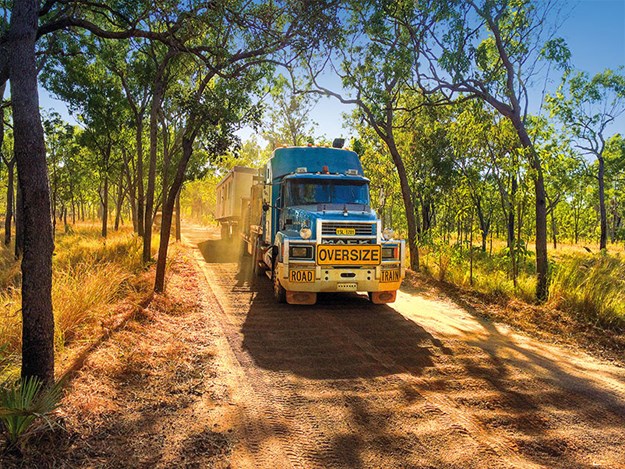 |
|
So far, the 2000 Mack CH has been a legend
|
Nick bought his 2000 Mack, CH Elite in Melbourne in 2010. He bought it sight unseen, and then he and Jo flew down to pick it up.
"Although the engine had done over a million kilometres, Nick wasn’t put off by it being an older truck, because he reckons, they are easier to fix if you break down in the bush. It was the right price and had all the things we wanted, such as Camelback leaf suspension, rather than airbag suspension, which isn’t good in the sand and dirt.
"Nick is very good with preventative maintenance. We spend the off-season doing bearings, bushes, and replacing and pulling things on and off the truck. The corrugated roads play havoc with the wiring. Some connections will come apart, you’ll get dirt in something, or a wire break. An old wire will become brittle from the heat of the engine or in the harness where you can’t see it, or there’s often some electrical problem, but Nick can fix anything."
The Mack boasts an extra-large sleeper, which is good because Nick and Jo are often away for two weeks.
"We take our Blue Heelers, Dusty, and Lynn with us, plus everything else we need while on the road—half the workshop comes along. Nick always has many spare parts; loads of air fittings and electrical bits and pieces, tools and spare hoses, bearings for the truck, trailer, and dolly, spare brake booster gear and rubbers and seals.
"We take everything to fix ourselves in case of a problem. With airlines rubbing through, it’s such a simple fix—like having a couple of brass fittings or a joiner. A few times, we’ve bumped into trucks, and they haven’t got any tools with them."
The Mack has proved itself to be a legend, says Jo.
"At 470hp (Renault motor), it’s not even that powerful. We’ve done a couple of jobs with other people, and our truck can keep up with them with no problems. It doesn’t matter how much horsepower you’ve got; you are still only doing 10kph, and it takes five to six days to travel 500km, idling along because the road is very rough. We see others go faster, but they break all their freight, and their dongas (transportable building) fall apart. We poke along very slowly. If we want to pull up for a swim in a creek, we do."
The grader and other gear
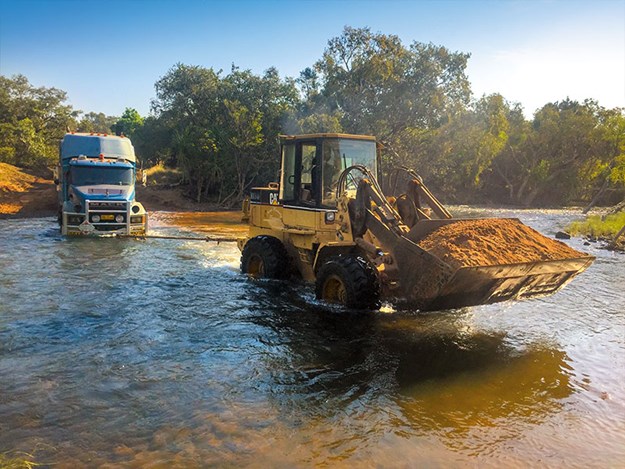 |
|
Getting a tow across the Carson River, near Kalumburu
|
Nick and Jo have two Caterpillar graders, a Cat front end loader, a Cat D4 bulldozer, plus a small freight truck. Trailer equipment includes three trailers: a tri-axle flat top, a freighter (five-axle flat top), and a small trailer, which get used according to the loads they’re carrying.
"If we are doing grading for parks and wildlife, the grader will go on the drop-deck trailer, and then the loader will go on the flat top. We have a 4500-litre fuel tank that will do us for the whole job. So, we chuck that on too and spare tyres, gear, tools, and everything we need for a big job.
"We also take out our little roadworks camp as well with everything in it. It’s a shipping container that we’ve decked out as accommodation with a kitchen. It goes on the bird trailer, and if we are out grading for a month, we take our mobile home with us.
"We usually park the truck up; we might be grading 100km up the road and move our camp with the grader 10km day until it ends back at the start. We use a Honda generator for our power and run it every day. It services the fridges and we either cook on an open fire at night or on a tiny gas stove."
Outback Truckers show
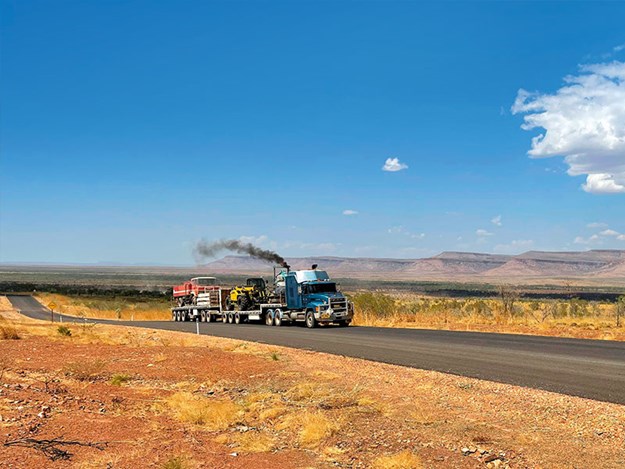 |
|
Full steam down the Gibb River Road with the Cockburn Ranges in the background
|
Nick and Jo were recommended to the production team at Outback Truckers by their trucking friend, Steve Grahame, who is also on the show.
"Steve used to go into mum and dad’s station when I was a kid. The film mob went with him on trips and asked, ‘who else do you know?’ He suggested us.
"Nick just wanted to show off Australia and the bush and the countryside. It was good, but now he finds he hasn’t got much time for them anymore because it has become very dramatic and American. You have a flat tyre, and it becomes big drama, and he doesn’t like that. It was never about that for him.
"He likes showing people going out into the bush and the wonderful scenery. Now they’re more worried about trying to get couples to have a blue (argument). They did four runs with us over episodes five, six, and seven and still call us. They got a bit pushy last year; they were trying to get us to reorganise our trips to suit them, but it doesn’t work like that. You get nothing out of it; it’s unpaid, which is good in a way. They can’t tell you ‘Oh, we missed that action, can you turn around and go back through the river again?’ What happens, happens and if you catch it in time, then good, if not, too bad."
The camera crew bring their swags and camp with Nick and Jo.
"They are always generally very nice. They hire a four-wheel drive and chuck some of the crew in there and one in the truck and shoot up ahead or set up a camera ahead."
Although Jo’s family thought it was cool that she and Nick were in the series, they were doubtful of them not wearing safety boots on TV.
"But they were proud, I guess. It’s nice to show off region and the aboriginal community we go to in Kalumburu."
Tourist attention
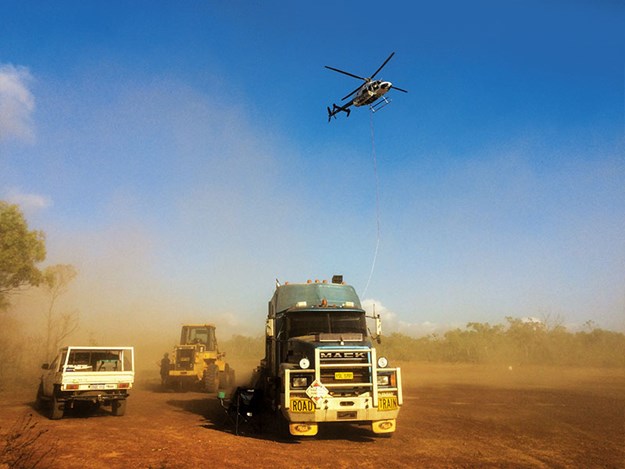 |
|
NKT trucked a load of water pipe into Far Away Bay. The chopper was used to sling it onto the site.
|
Tourists flock to the Kimberley region during June and July, many in campervans and some off-road tour buses.
"They are excited to see a big truck, and most are good and get out of the way. Occasionally, Nick gets cross when you get someone calling you up on the radio, insisting they must pass you. We’ve had tour buses, and they can’t see a thing and come whipping up beside you. Nick gets upset if people do dangerous stuff. But in saying that, most tourists are good. Most of them want to get a photo of the truck as it goes past in a cloud of dust."
Off the beaten track
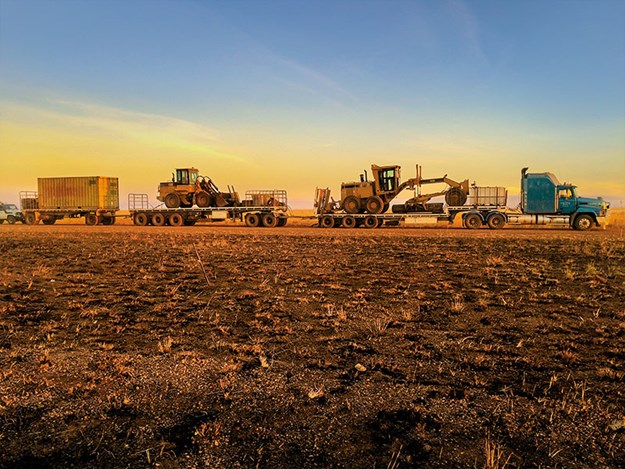 |
|
Going home after a road grading job for Parks and Wildlife
|
I ask Jo if they enjoy being able to help people who live off the beaten track?
"Yes, we do. It is nice to provide a service to a place where few people go. Many companies put it in the too-hard basket.
"We like to offer our services at a fair price, and we think just because it’s a remote location, you don’t have to rip people off or charge 10 times the going price. We do it as a lifestyle thing.
"Sometimes we’ve picked up cars and never got paid or picked up a broken-down tourist car, and they’d been quoted $5000–6000 for a tilt tray, and they paid us with a carton of beer. We thought, poor buggers, they don’t have much money."
The bush telegraph works well to let people know when NKT is loading for the next trip.
"We go to different places around town and set the date we are leaving, and everyone has to get it there on time.
"Then we go to yards and depots to do pick-ups. Some loads are on a pallet, and others are loose. It takes a huge amount of time; we are always restacking and reloading. Then unloading, often by hand at the other end because we can reach our destination and there is no forklift or tractor."
Facebook posts also get the word out that the big blue Mack is loading up, but Jo says it’s often mostly old-fashioned communication among the community and the pair making phone calls.
"We build the load as we go. Then see how we can fill other pallet spaces—that’s when we get on the phone.
"It’s a funny thing; it’s a small area, and it’s inconsistent at times, and we only go when there’s enough freight. We never know when we are going. It’s a moving feast. Sometimes it doesn’t work out, and people have to wait until we are full."
A wild life
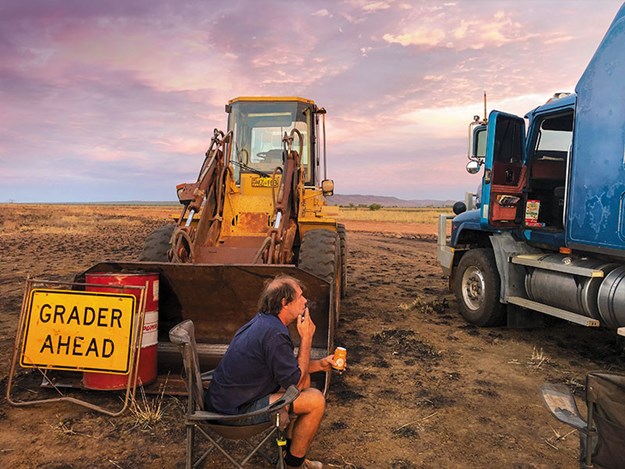 |
|
Nick enjoys a well—earned beer at the end of the day
|
Both Jo and Nick enjoy the wildlife they see while on their trips.
"We see donkeys and camels and lots of birdlife, freshwater crocodiles, and a few snakes. If you leave things alone, they don’t bother you. Often, we camp out on a river. It’s special to be out there by yourself and to work remotely. When you knock off, you’re there in the middle of the bush. At the end of the day, when Nick’s done the day’s grading, we are right here.
"We both love the bush and being remote. We complement each other; Nick is an amazing bush mechanic and can fix anything,"
Jo says she’s capable with machinery too.
"I can drive the truck if it’s to move it from A to B, and I can get away with not using all the gears but generally work hard to avoid it. Sometimes when we are bogged, I will drive the truck while Nick pulls us out with the grader or loader.
"I drive the loader the most, usually if we’re clearing regrowth of old fence lines. I will go ahead, and clear trees with the loader and Nick will come along behind and grade.
"Also, we use it to load or unload freight sometimes. I drive the grader if we are travelling/moving camp and tow the camp, and Nick will follow in the truck. I always say there is a big difference between driving and operating, I can drive from A to B, but Nick can operate gear and make it do amazing things."
Nick and Jo, who celebrated their 11th wedding anniversary in May this year, can’t think of anything else they’d rather do. "We have a fair bit of fun most of the time. Nick’s pretty adventurous, and he likes it because of the challenge.
"However, he’s been a bit down on the transport industry these last few years, with all the paperwork and red tape. You seem to have so many permits for this and accreditation for that. He’s never been into that. He likes trucking out in the bush and going where people think you can’t go. He’s a free spirit. But we do love getting home too. In the wet season, our mates will ask us to come out camping and we say, ‘no way! We camp all year’."
The NKT work
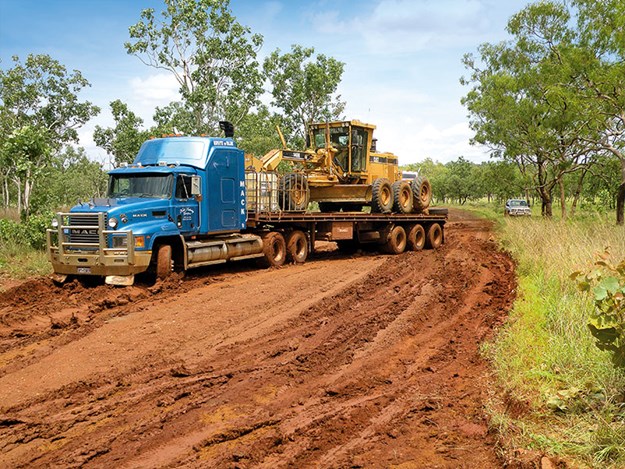 |
|
Getting out of a sticky situation: bogged down on the Kalumburu Road
|
NKT provides general grading services, including road formation, maintenance grading, flood damage repair, new road construction, clearing, firebreaks, station, and community access roads.
NKT also provides general freight services (specialising in remote areas and dirt roads), transporting everything from plant and equipment, transportable buildings, shipping containers, building materials, vehicles, general stores, and supplies.
As long-term local residents, NKT has the knowledge and experience needed when it comes to working in the Kimberley, especially in its remote areas.
Find new and used trucks for sale in NZ
Keep up to date in the industry by signing up to Deals on Wheels' free newsletter or liking us on Facebook.




.jpg)


.jpg)
.jpg)
.jpg)
.jpg)
.jpg)
.jpg)
